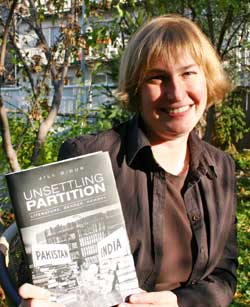Letting silence speak

Jill Didur (English) with her new publication.
Bart Simon
In 1947, British colonialism ended in South East Asia and over 12 million people moved to and from the area, eventually settling into the modern nation-states of Pakistan and India, and what later became Bangladesh.
The violence and upheaval of Partition, as these events have come to be known, included the abduction and sexual assault of 75,000 women, and, in some cases, their subsequent reunion with their families. This aspect of Partition is often absent from official accounts of the period. Historians have recently attempted to “recover” this chapter of history by using fictional narratives about the events.
In Unsettling Partition: Literature, Gender and Memory, Jill Didur (English) turns her attention to the silence around those events and recent efforts to fill in its gaps through the study of literature and testimony reflecting on the upheaval that took place. Didur “unsettles” this direct reading of fiction and testimony as fact.
“Some researchers seem to treat narratives about these experiences as a kind of substitute record of the period without taking into account the way language, social context and genre have shaped how these things are narrated,” Didur said in a recent email interview.
Unsettling Partition examines several fictional accounts and their “recovery” and interpretation, in order to redirect the discussion “away from a kind of blunt sociological reading of this material toward its literary qualities, which are equally politicized.”
In so doing, Didur inserts the question of gender. She argues that the silence can be read as a refusal of the view of women “as repositories of community and national identity [at the time of Partition, which] may have played into the targeting of women for violence.” Didur conceded that this is not necessarily a popular interpretation.
Her research project began with an interest in transnational and postcolonial culture that was supported by her participation in a cross-cultural exchange project in India before she began her graduate work at York University. At York, she found an interdisciplinary approach that reinforced her own interest in theory, literature and cultural studies.
She began the work at Jawaharlal Nehru University in Delhi through a Shastri research fellowship just prior to the fiftieth anniversary of India’s independence. It was an excellent opportunity to consider the way the events in question were interpreted and retold. Unsettling Partition, published this year, enters a growing dialogue with creative writers, filmmakers and historians.
Didur has also considered how translation has impacted the narratives. English is considered a default “link language” between various languages of the region. However, in one chapter, she explores how different translations of the short story “Lajwanti” present varying interpretations of the title character’s behaviour.
“It became clear to me that translations were adding another historical layer to how Partition history and memory were being commemorated.”
Didur, who came to Concordia in 1998, is on maternity leave. She has SHRCC and FQRSC funding to study contemporary South Asian writers and filmmakers and how the concept of Indian identity and secular discourse is constituted in the wake of Partition.